Depending on the size of the organization or project, there can be dozens of project management roles to make sure everything is running smoothly. The project administrator helps project management teams with administrative tasks and supporting activities. They’re not merely paper-pushers; they’re responsible for keeping the project moving forward by ensuring everyone has what they need.
What Is a Project Administrator?
A project administrator is a person responsible for helping with many of the duties surrounding project management. As the name implies, they look after the administrative jobs associated with the project such as staying in touch with members of the project team and stakeholders, facilitating project meetings, assisting with procurement activities and helping to prepare project documents and reports.
Several industries hire project administrators, such as engineering, pharmaceutical, healthcare, research and more. They tend to find employment at organizations that handle more complex jobs and therefore require larger project teams. In many respects, the project administrator is the project manager’s right hand and deals with recurring tasks so the project manager can focus on the project plan.
Get your free
Project Administrator Job Description
Use this free Project Administrator Job Description for Word to manage your projects better.
Main Duties & Responsibilities of a Project Administrator
The duties that fall under the purview of a project administrator are diverse. They range from mundane to critical tasks that are fundamental to the project’s success. A project management administrator is typically asked to do the following:
- Make phone calls
- Keep track of budgets and project expenditures
- Help set up project meetings
- Handle the minute-taking at meetings
- Organize venues
- Assist with planning
- Keep the project calendar up to date
- Administrative duties
- Track projects
- Offer suggestions to improve efficiencies
- Maintain compliance regulations
- Assess employee performance
- Hire contractors
These duties, of course, vary depending on the organization and the project. But suffice it to say, the project administrator takes the smaller responsibilities off the project manager’s desk or prepares work for the project manager to do. It’s a great way to get an inside look at project management and build relevant skills.
The project administrator usually reports to the project manager, but again, this depends on the organization. For example, some projects have a project coordinator, project manager, assistant project manager and so forth. If this is the case, the project coordinator would likely report to the next in command, who would then move the data up the ladder to eventually get to the project manager.
Project administrators need the right tools to keep up with all their responsibilities. ProjectManager is robust project management software that offers project planning, scheduling and tracking tools for project administrators, project managers and other project management roles. In addition, ProjectManager has document management tools, unlimited file storage, real-time collaboration features and more to help project teams be more productive.
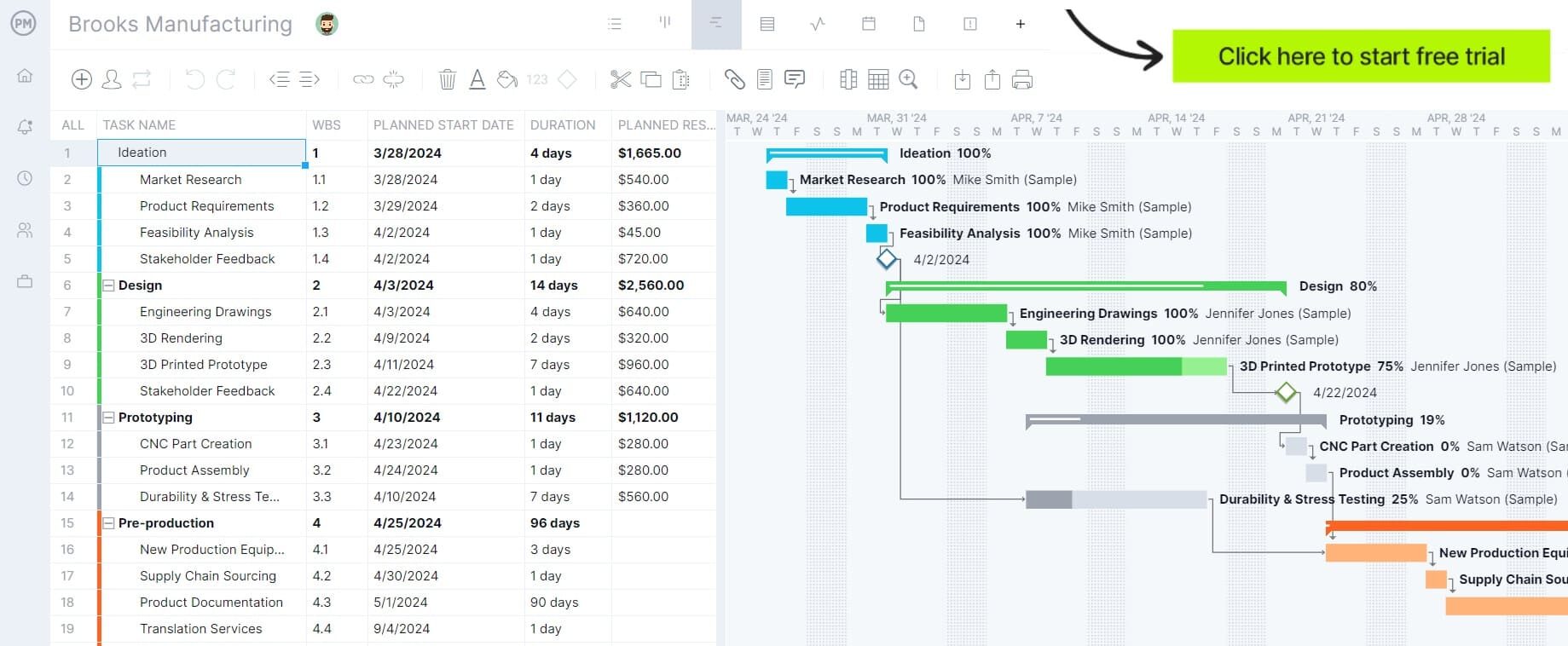
Project Administrator Skills
Speaking of skills, what would the potential project administrator need to be considered for the job? Before we start, again, it’s important to note that every organization is different and their requirements vary. What follows is a general description of what most employers would look for when hiring a project administrator.
In terms of work-related skills, employers are looking for people who are well organized and are familiar with at least the basics of project management, such as planning, time management, task management, etc. The candidate should ideally have supervisory skills, be computer literate, especially with project management tools, and have strong oral and written communication skills. Professionalism and being on time, proactive and open to new things are a must. Speaking more than one language is often a valuable asset.
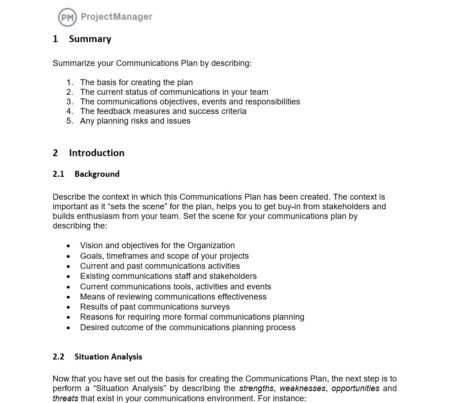
Project Administrator Education
Education is critical, especially for those who are applying with little or no experience. For the most part, employers are looking for candidates who have a degree in business. If the person looking to fill the position has worked for a long time in project management in various capacities, then it’s possible a high school diploma would be sufficient.
We mentioned certification, and having started or graduated from any one of the accredited project management certification programs would play in your favor. If you’re looking for something more than an entry-level project administrator position, then certification is strongly recommended. Senior project administrators are usually well-qualified, with certification, experience and even master’s degrees in the field.
What Is Project Administration?
Project administration can be defined as the process of managing administrative tasks such as creating and storing documents, ordering supplies, setting up meetings and other activities that allow project management teams to plan, execute and deliver projects successfully. The project administration process takes place simultaneously with the phases of the project life cycle.
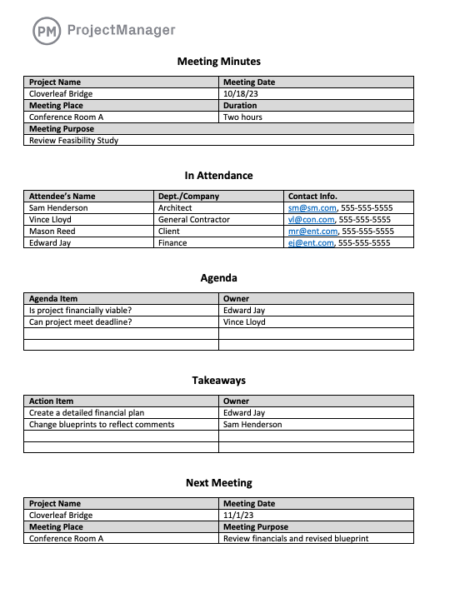
Sample Project Administrator Job Description
If you’re looking to fill a position as a project management administrator or looking to fill that position in your own organization, the following example of a project administrator job description will help you get the skills and experience you need or hire the person who has those requirements.
Wanted: Project Administrator
Primary Responsibilities
- Scheduling meetings and recording minutes
- Breaking down the final deliverable into tasks and timeframes
- Creating and updating workflows
Job Brief
We are seeking a motivated self-starter for a project administrator position in our company. You will be responsible, among other things, for coordinating project activities, maintaining and updating the project schedule, managing assignments, monitoring progress and communicating with the project team.
The project administrator will report to the project manager and assist with preparing action plans, analyzing risk and managing resources. You’ll work closely with the project coordinator and the project team, so strong communication skills are a must. Your mission is to help the project meet quality standards and deliver on time and within budget.
Responsibilities
- Help the project manager with administrative duties and processes
- Schedule meetings and keep minutes
- Break down the project into doable tasks and estimate the duration
- Assist with planning, from start to finish of the project
- Prepare and distribute project materials
- Implement policies and procedures
- Create weekly workflow
- Order resources
- Track expenses and work on budget forecast
- Monitor progress
- Alert the project manager to issues as they arise
- Report on team and project performance
- Act as point of contact for the project team and facilitate communications
- Assess project risk
- Calculate project metrics, such as quality, costs, health, etc.
- Supervise and delegate tasks to project assistants
- Collaborate on stakeholder presentations
- Foster positive relationships with stakeholders
Requirements and Qualifications
- Associate or bachelor’s degree required
- Master’s degree preferred
- Two years of related experience
- Knowledge or project management, flowcharts, technical documentation, etc.
- Strong leadership skills
- Team player
- Deadline-driven
- Organized and focused
- Computer literate
- Certifications a plus
Project Administrator Salary
The salary of a project administrator is contingent on experience and varies wildly depending on the region. That said, the average annual pay an administrator can expect in the United States is about $66,000. The low end of the spectrum is $46,000, with $107,000 being the peak.
Project Administrator vs. Project Manager
Project managers are in charge of overseeing the five phases of the project lifecycle, which are initiating, planning, monitoring, and closing projects. They’re in charge of project teams and are higher in the hierarchy of project management than project administrators. While project managers oversee the bigger picture of the project, project administrators focus on very specific tasks such as keeping project documentation and scheduling meetings.
Project Administrator vs. Project Coordinator
These are two very similar roles, however, the main difference between these two project management roles is that project coordinators have a wider range of functions and are more involved with the day-to-day activities of the project team such as monitoring the performance of team members, while project administrators are more of a support role that maintains project documentation and helps with administrative functions.
ProjectManager Is the Ideal Tool for Project Administrators
Now you know that a project administrator is doing much of the busy work that helps lead to a successful project end. They have duties that pertain to every phase of a project. Mostly, they need to be organized and keep the project on track. ProjectManager is a fantastic option to help teams and projects stay organized.
Track Your Projects With Dashboards
The great thing about our online software is that everyone on the team can use it. As teams complete tasks and projects move along, project administrators can make data-driven decisions using our project dashboards. For project administrators, this is a crucial tool to monitor the project and catch any irregularities before they develop into problems that might sidetrack the project.
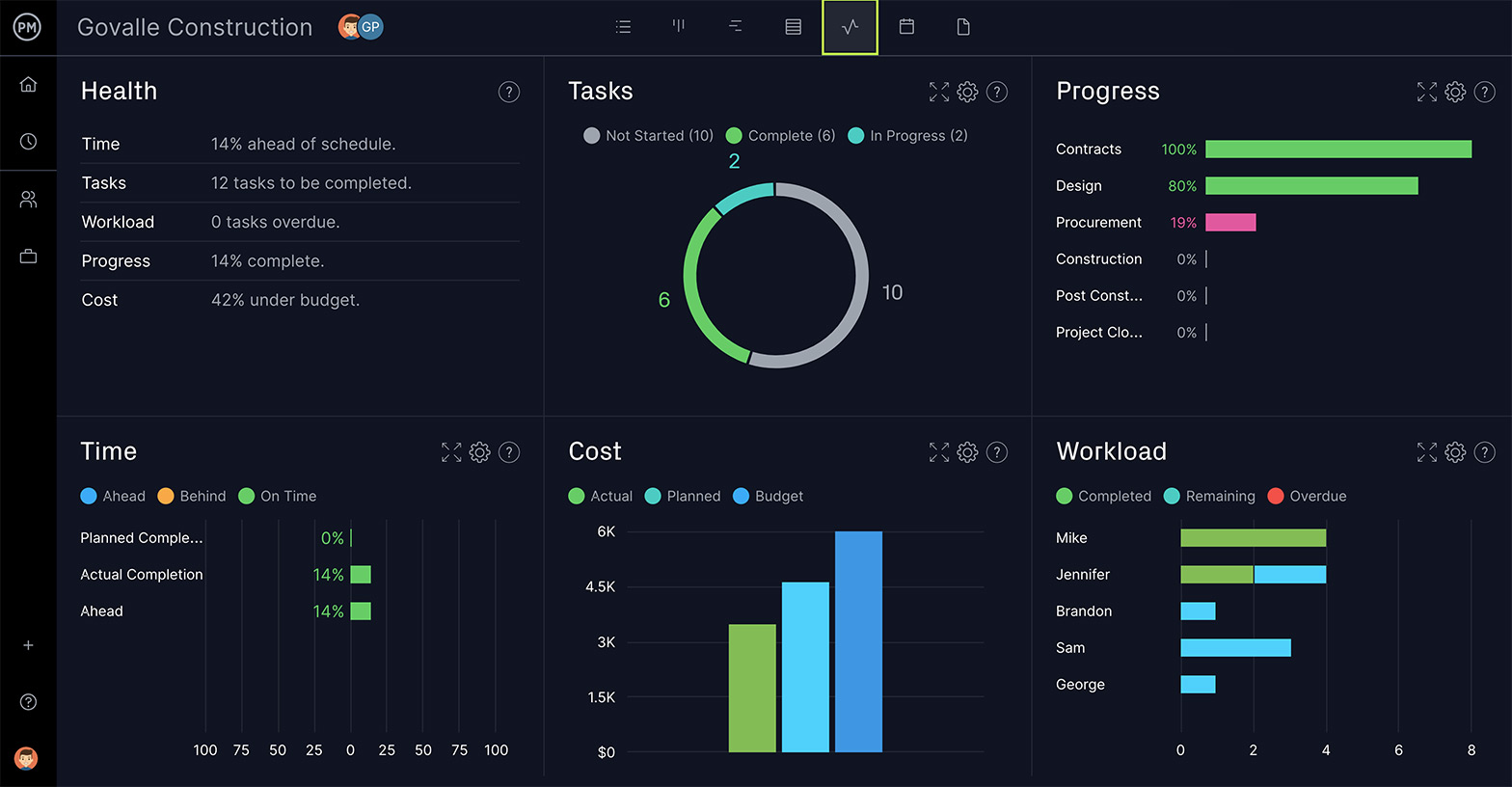
Gantt Charts Keep Your Project on Track
Planning a project is the first hurdle one must clear and it’ll impact the rest of the project—so you have to do it right. Our online Gantt chart allows the project administrator to take all the tasks collected to reach the final deliverable and organize them on a project timeline, estimating duration and linking dependencies to avoid bottlenecks. The larger project can also be broken down into phases with our milestone feature on the Gantt.
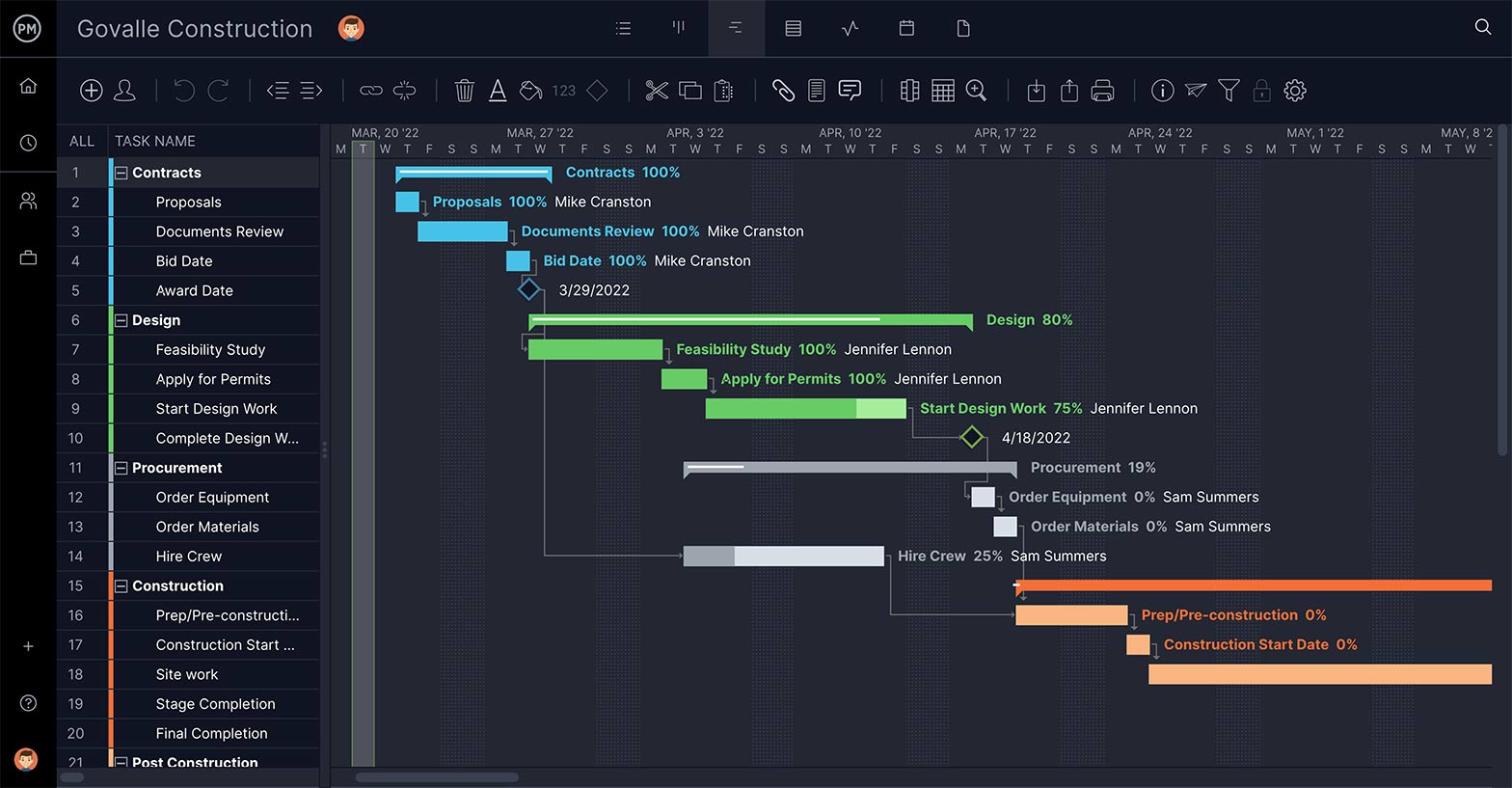
Report Your Progress to Stakeholders
Project administrators help the project manager create reports for stakeholder presentations and to monitor the project’s progress. Our reports can be generated with a keystroke and show essential project metrics, such as project variance, cost, task, time and more. They can be filtered, so you get just the information you want, and then easily shared.
It’s hard being a project administrator, but with ProjectManager, you have the tools to get the job done right.
Related Content
- How to Start a Project Management Career
- 10 Key Project Roles & Their Responsibilities
- Top 30 Project Management Skills
- Top 10 Project Management Qualifications
- Best 12 Project Management Certifications
ProjectManager is online project management software that helps with every phase of a project. Our features include multiple project views, including kanban boards that visualize workflow, as well as Gantt chart, task list and calendar views. See why tens of thousands of teams at organizations are varied as Bank of America and NASA choose us to help them manage their projects. Take ProjectManager’s free 30-day trial today.

